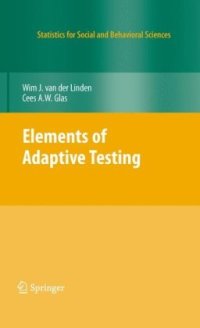
Ebook: Elements of Adaptive Testing
- Tags: Statistics for Social Science Behavorial Science Education Public Policy and Law, Assessment Testing and Evaluation, Psychometrics
- Series: Statistics for Social and Behavioral Sciences
- Year: 2010
- Publisher: Springer-Verlag New York
- Edition: 1
- Language: English
- pdf
The arrival of the computer in educational and psychological testing has led to the current popularity of adaptive testing---a testing format in which the computer uses statistical information about the test items to automatically adapt their selection to a real-time update of the test taker’s ability estimate. This book covers such key features of adaptive testing as item selection and ability estimation, adaptive testing with multidimensional abilities, sequencing adaptive test batteries, multistage adaptive testing, item-pool design and maintenance, estimation of item and item-family parameters, item and person fit, as well as adaptive mastery and classification testing. It also shows how these features are used in the daily operations of several large-scale adaptive testing programs.
Wim J. van der Linden is Chief Research Scientist at CTB/McGraw-Hill, Monterey, CA. His specialization is psychometric theory and methods, and he has been an active researcher of adaptive testing throughout his career. For Springer, he wrote Linear Models for Optimal Test Design (2005) and co-edited Handbook of Modern Item ResponseTheory (1997). He is a past president of the Psychometric Society and recipient of lifetime achievement awards from the National Council for Measurement in Education (NCME) and the Association of Test Publishers (ATP).
Cees A. W. Glas is Professor of Social Science Research Methodology, University of Twente, the Netherlands. His specialization is psychometric theory and methods, with an emphasis on item response theory, adaptive testing, model fit analysis, and missing data. Professor Glas is a co-author of Educational Evaluation, Assessment, and Monitoring (Swets & Zetlinger, 2003). Currently, he is a member of the Editorial Board of Psychometrika and serves as a technical consultant to the OECD programs for international student assessment (PISA) and the assessment of adult competencies (PIAAC).
The arrival of the computer in educational and psychological testing has led to the current popularity of adaptive testing---a testing format in which the computer uses statistical information about the test items to automatically adapt their selection to a real-time update of the test taker’s ability estimate. This book covers such key features of adaptive testing as item selection and ability estimation, adaptive testing with multidimensional abilities, sequencing adaptive test batteries, multistage adaptive testing, item-pool design and maintenance, estimation of item and item-family parameters, item and person fit, as well as adaptive mastery and classification testing. It also shows how these features are used in the daily operations of several large-scale adaptive testing programs.